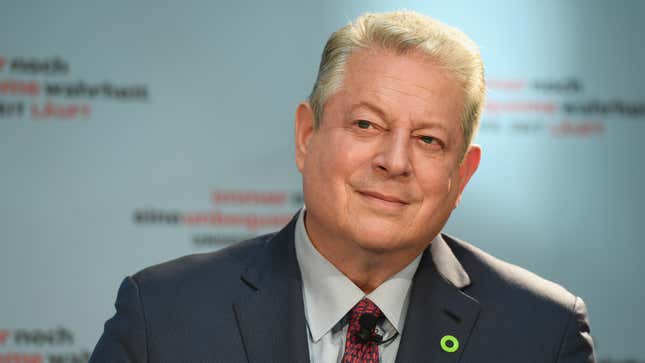
For the first time ever, the world will have technology to track greenhouse gas emissions in near real-time. That’s the promise of Climate TRACE, a coalition of nine organizations led by former Vice President Al Gore.
The group says it will use a combination of satellite data, artificial intelligence, and other technology to remotely track global greenhouse gas emissions. They have developed an early prototype of the tracking system and plan to have a full version ready by next summer, before the next round of international climate negotiations.
The alliance believes that by speeding up the process of counting emissions and by providing a quantitative accountability measure, the new platform could revolutionize the United Nations’ climate talks and the world’s efforts to curb climate change. Climate TRACE says that by improving accountability, their project could inspire confidence in negotiations and lead to the adoption of more ambitious targets. But new technology alone won’t solve the fundamental political issues at the heart of the international climate talks, which are not about a lack of technology, but who has power.
“Technologies by themselves don’t really do anything,” Nils Markusson, a lecturer at Lancaster University whose research focuses on the politics of environmental technology, told Earther. “It’s about how you use them.”
The way emissions are currently tracked is largely self-reported, slowly collected, and not uniform. That leaves policymakers with a somewhat incomplete picture of the task at hand. For instance, in the months before the UN’s 2016 international climate talks, China revealed that it had underestimated its coal burning by 17% and thereby undercounted its greenhouse gas emissions by 1 billion tons.
“We haven’t had a way to verify that these numbers are accurate; incorrect data could be a result of purposeful misreporting or the fact that many regions of the world don’t have access to the tools needed to measure emissions correctly,” Gavin McCormick, executive director of the clean energy technology firm WattTime, who co-leads the organization, told Earther in an email. “We keep hearing that actually one of the best things that could happen to help accelerate climate targets (on the national, city, and corporate level) would be if every actor could know that going forward, they could trust what every other actor said.”
But while accurate accounting is an important piece of the fight for effective policy, it cannot be achieved with new technology alone. For years, environmental advocates have raised issues with emissions counting that are baked into international climate negotiations themselves.
“The gap this effort is trying to fill is one that’s a result of effective enforcement of international climate policy,” Sriram Madhusoodanan, deputy campaigns director of Corporate Accountability, who has followed the UN climate talks for years, told Earther. “And that’s no mistake or coincidence. That’s a result of countries like the U.S. asking, often on behalf of polluting corporations and industries, to have this lack of effective accounting.”
For instance, climate justice advocates have long warned of the ineffectiveness of the Paris Climate Agreement’s carbon market mechanisms. Carbon markets are a favorite climate policy of Big Oil because they allow major polluters to offset their greenhouse gas footprint by paying for other countries’ carbon-saving projects. But the way the Paris Agreement was written, these emissions reductions could be counted twice, by both the country selling and buying carbon credits based on decarbonizing projects, such as renewable energy or reforestation. That’s led to an inaccurate picture of greenhouse gas drawdown, and the world doesn’t need new technology to show us that that’s the case.
In addition, while Climate TRACE’s technology will, if successful at scale, more accurately show how much companies and countries have decreased their greenhouse gas emissions, it will not show how they did so. For instance, the use of carbon offsets has not only had issues of double-counting but also led to widespread displacement and other environmental injustices.
“You wouldn’t take into account all the social effects,” Markusson said. “And obviously that wouldn’t be measured.”
The Climate TRACE coalition also says it could help build capacity for actors who “desire better data but lack the capacity to measure emissions.” This could, for instance, apply to poorer countries in the Global South that don’t have the money and technological means to monitor their emissions very carefully. For Markusson, that possibility raises concerns, because it may actually put too much of a spotlight on developing, poorer countries, ignoring the fact that it’s more difficult for those countries to draw down their emissions than richer ones with bigger greenhouse gas footprints.
“I can see that might be helpful, but it might also be abused as a way of picking on countries that are relatively poor and bear a relatively small part of the blame for the problem,” said Markusson.
In short, while accounting mechanisms have been a challenge, the bigger challenges of international climate negotiations have been political, not technological.
There’s already ample evidence that the top way the world can slow the climate crisis is by phasing out the production of fossil fuels. Wealthy, developed countries—which have been more responsible for extracting and burning fossil fuels—bear a particularly large responsibility to do so. But despite study after study demonstrating all this, we haven’t seen the change we need.
“There’s a danger in trying to tech our way out of this when we already know what needs to happen,” Collin Rees, a campaigner at Oil Change International, told Earther.